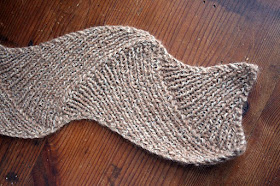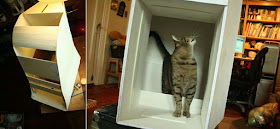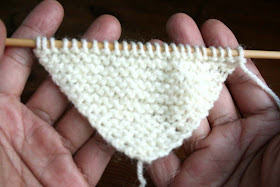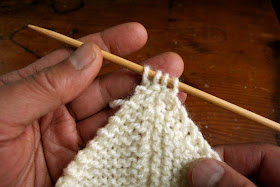It’s always a bit difficult naming something, I think that’s why some
great works of art are left untitled. Sometimes I employ a loose organic process to jog my brain. First I come up with names that I
would never use: Sandy Ripples... sounds like a stripper; Tsunami...
too soon; Duin-hir (River Lord)... I’ll get sued by the Tolkein Foundation; Esoteric Waves... too esoteric... etc. And when I’m done laughing, I think of more realistic possibilities for names.
For now I’m calling this pattern Ebb Tide. This winding, seven foot long scarf is a gift from Clive Baillie to his wife, Dawn. This original pattern is part of my Eleven Anthropology collection.
Much like the ribbed impressions left in the sand as the tide pulls away, Ebb Tide reminds me of a bygone day. With every twist and turn, it walks me down a familiar shore past the remains of sand castles, listening to the echo of crashing waves. I can almost feel the wet sand crushing between my toes.
This scarf is made with Aurora 4 (Karabella Yarns), a DK weight super washed merino. It’s very light and warm, perfect for chilly evenings on the beach. It has such an elegant drape — it unfurls like silken strands of seaweed.
Pages
▼
Wednesday, December 28, 2011
Monday, December 26, 2011
It’s a Dog’s Life
If this sweaters seems a bit big in the chest, that’s because this is actually a sweater for a dog named Timba — my friend Jenn's mother’s Lhasa Apso. Phillip the Cat is just my fit model. I wanted to make sure the sleeve placement was directly below the body.
I love this tweedy blue yarn, it’s dog-worthy. The sweater is knit up to the neck and down the body from a central back strap. This design has a lot of opportunity for applying patterns.
The back strap has simple 3 X 3 cable that travels from sleeve to sleeve. The neckline is turned at the chest for a better fit, ending in a reinforced mock turtle collar.

Broad ram’s horns and twisted columns travel down the back over a single rib ground. The body itself is shorter in the under carriage (than on the back). This allows more freedom to... do what dogs naturally do. The garter stitch hem give it more elasticity and stability.
Washed, blocked and pressed flat — this sweater was delivered. Oddly enough it’s going to Florida for now. Maybe I should have made Timba a Guayabara, I don’t know how I would have finished this without Phillip’s help. He’s such a good sport. Thanks again Phillip, there’s a bag of treats with your name on it.
I love this tweedy blue yarn, it’s dog-worthy. The sweater is knit up to the neck and down the body from a central back strap. This design has a lot of opportunity for applying patterns.
The back strap has simple 3 X 3 cable that travels from sleeve to sleeve. The neckline is turned at the chest for a better fit, ending in a reinforced mock turtle collar.

Broad ram’s horns and twisted columns travel down the back over a single rib ground. The body itself is shorter in the under carriage (than on the back). This allows more freedom to... do what dogs naturally do. The garter stitch hem give it more elasticity and stability.
Washed, blocked and pressed flat — this sweater was delivered. Oddly enough it’s going to Florida for now. Maybe I should have made Timba a Guayabara, I don’t know how I would have finished this without Phillip’s help. He’s such a good sport. Thanks again Phillip, there’s a bag of treats with your name on it.
Tuesday, December 20, 2011
Knit PH @ Prospect Perk Café, Dec. 13, 2011
Knit PH met at Prospect Perk Café to knit and nosh. The weather lately has actually been warm for December, 62° to be exact. Luise was there first — just off from work. I promised I’d give her a quick tutorial on my Cat Blanket before the year came to an end. I predict that 2012 will be the year of the cat quilt. Chrystal made it all the way from Bushwick by bus. I have to admit that I don’t know where they go on a regular basis. I actually get a little motion sick when I try to read on the bus...stopping... starting, stopping again... etc.
I’ve been working on a new scarf pattern for my Elven Anthropology collection. I was inspired by the soft ribs of sand left behind as the water recedes at day’s end. For lack of a better name I call it Ebb Tide, at least for now. As the temperature steadily drops I’ll need something to remind me of a warm day at the beach.
Christmas will soon be here, yet most haven’t even started shopping for gifts. You have to wonder what posses someone to make their own gifts this late in the game —yet every year we all do it. I know I’ll be running late (again) with a few home-spun gifts; Pat dropped in with her new scarf in progress; Lisa finished her husband’s Hunter Green house slippers — complete with snow-flake pattern.
Adrienne needed a little help finishing off a few things for their daughter, Bird. I helped her through instructions for attaching an I-cord to a baby bonnet. This is an excellent way to clean up raw edges.
These itsy-bitsy booties will keep Bird’s feet warm all winter, until she outgrows them. The safety pin gives you an idea of scale and skill. But Adrienne brought a show-and-tell item which left us all laughing — the Boob-Hider. It’s worn by the baby when nursing in public. Chrystal added “Everyone knows what you’re already doing... so y’know.” She’s also a lactation consultant.
I’ve been working on a new scarf pattern for my Elven Anthropology collection. I was inspired by the soft ribs of sand left behind as the water recedes at day’s end. For lack of a better name I call it Ebb Tide, at least for now. As the temperature steadily drops I’ll need something to remind me of a warm day at the beach.
Christmas will soon be here, yet most haven’t even started shopping for gifts. You have to wonder what posses someone to make their own gifts this late in the game —yet every year we all do it. I know I’ll be running late (again) with a few home-spun gifts; Pat dropped in with her new scarf in progress; Lisa finished her husband’s Hunter Green house slippers — complete with snow-flake pattern.
Adrienne needed a little help finishing off a few things for their daughter, Bird. I helped her through instructions for attaching an I-cord to a baby bonnet. This is an excellent way to clean up raw edges.
These itsy-bitsy booties will keep Bird’s feet warm all winter, until she outgrows them. The safety pin gives you an idea of scale and skill. But Adrienne brought a show-and-tell item which left us all laughing — the Boob-Hider. It’s worn by the baby when nursing in public. Chrystal added “Everyone knows what you’re already doing... so y’know.” She’s also a lactation consultant.
Monday, December 19, 2011
Flatbread Made with Chickpea Flour
I finally used up the last of the chickpea flour. I made Socca, a type of flatbread or crêpe from Southern France. The ingredients are simple — everything came from my local grocery store. You’ll need a cast iron griddle or a large cast iron pan.
Bean flours are super nutritious foods that are high in protein and fiber and low in fat. They are essential to vegan cooking. Bean flours are also a great alternatives for people who can’t eat wheat products, such as pasta and breads. But when combined with grain, they create a complete protein.
I’ve used the Bob's Red Mill brand, but if you can find it, use Indian Besan. It has a finer mill and makes a smooth thin batter. Socca is typically eaten as street food in the open markets, stuffed with savory things like potatoes and goat cheese. I just ate them fresh out of the oven — socca has a subtle sweet flavor when it’s made fresh.
For this socca recipe and more, visit GardenFork.tv.
Bean flours are super nutritious foods that are high in protein and fiber and low in fat. They are essential to vegan cooking. Bean flours are also a great alternatives for people who can’t eat wheat products, such as pasta and breads. But when combined with grain, they create a complete protein.
I’ve used the Bob's Red Mill brand, but if you can find it, use Indian Besan. It has a finer mill and makes a smooth thin batter. Socca is typically eaten as street food in the open markets, stuffed with savory things like potatoes and goat cheese. I just ate them fresh out of the oven — socca has a subtle sweet flavor when it’s made fresh.
For this socca recipe and more, visit GardenFork.tv.
Tuesday, December 13, 2011
Dälahast — How Swede It Is!
Julälsningar to my Scandinavian readers. That's Swedish for Season’s Greetings. The Dälahast (a.k.a Dala Horse, or Dalecarlian Horse) is a wooden children’s toy traditionally carved over cold long winters in the province of Dalarna. It has become the unofficial symbol of Sweden.
Several types of Dälahast are distinguished by locality. The most typical carvings are painted bright red with graphic details in white, green, yellow and blue. They stand anywhere from 6" to 36" tall, but the largest Dälahast in the world can be found in Avesta Municipality in Sweden. This concrete monument looms above trees at over 42'.
The Dälahast that I made for Tretorn Shoes is 6'3". Henrik is made entirely of Papier Machier, this Swedish steed graces their store front in Soho eagerly greeting Holiday shoppers.
The decorative method of applying two colors on the same brush is called rosemaling — a skilled freehand craft. Rosemal patterns often adorn their woodwork and ceramics. I’m a very big fan of Scandinavian design — traditional and modern. I especially am fond of the graphic patterns and motifs found in their knitting, and of course the organic nature of their furniture — all of these borne of Scandinavian innovation.
But how does one make something so large in a small Brooklyn living room? I mapped out the structure and created a hollow modular pieces. Each piece assembles together precisely.
My assistant, Phillip the Cat, inspected the interior for structural flaws — he approved. The interior of the head and body is a small engineering marvel, built with interior struts to hold its shape and support its weight. The head and legs attach to the body by mortise and tenon.
The entire horse is covered in four to six layers of paper and glue, primed with two coats of gesso, two coats of orange under coat, and a red top coat. These layers of paint give the Dälahast the deepest red. Each piece is decorated separately.
In 1891 Tretorn was founded by Henry Dunker in Helsingborg, Sweden. Although this company is known for fine tennis products, rubber soled boots and sneakers, the company originally produced high quality rubber for tires. Tretorn’s long history of rubber production evolved from tires to tennis balls in 1902 and, later, a complete line of rubber soled sport shoes in 1934. I particularly love their rubber boots. They are exemplary of Swedish design and innovation.
I have to say I’m very proud of Henrik, it was hard to set him free. He’s a handsome fellow, no? Swing by Tretorn if you’re in Soho and say hej to Henrik.
Tretorn
150 Spring St (bet W B'way & Wooster)
New York, NY 10012
Several types of Dälahast are distinguished by locality. The most typical carvings are painted bright red with graphic details in white, green, yellow and blue. They stand anywhere from 6" to 36" tall, but the largest Dälahast in the world can be found in Avesta Municipality in Sweden. This concrete monument looms above trees at over 42'.
The Dälahast that I made for Tretorn Shoes is 6'3". Henrik is made entirely of Papier Machier, this Swedish steed graces their store front in Soho eagerly greeting Holiday shoppers.
The decorative method of applying two colors on the same brush is called rosemaling — a skilled freehand craft. Rosemal patterns often adorn their woodwork and ceramics. I’m a very big fan of Scandinavian design — traditional and modern. I especially am fond of the graphic patterns and motifs found in their knitting, and of course the organic nature of their furniture — all of these borne of Scandinavian innovation.
But how does one make something so large in a small Brooklyn living room? I mapped out the structure and created a hollow modular pieces. Each piece assembles together precisely.
My assistant, Phillip the Cat, inspected the interior for structural flaws — he approved. The interior of the head and body is a small engineering marvel, built with interior struts to hold its shape and support its weight. The head and legs attach to the body by mortise and tenon.
The entire horse is covered in four to six layers of paper and glue, primed with two coats of gesso, two coats of orange under coat, and a red top coat. These layers of paint give the Dälahast the deepest red. Each piece is decorated separately.
In 1891 Tretorn was founded by Henry Dunker in Helsingborg, Sweden. Although this company is known for fine tennis products, rubber soled boots and sneakers, the company originally produced high quality rubber for tires. Tretorn’s long history of rubber production evolved from tires to tennis balls in 1902 and, later, a complete line of rubber soled sport shoes in 1934. I particularly love their rubber boots. They are exemplary of Swedish design and innovation.
I have to say I’m very proud of Henrik, it was hard to set him free. He’s a handsome fellow, no? Swing by Tretorn if you’re in Soho and say hej to Henrik.
Tretorn
150 Spring St (bet W B'way & Wooster)
New York, NY 10012
Sunday, December 11, 2011
The Multi-directional Scarf — a Short Row Exploration
I recently hosted an instructional knitting circle at Headroom Digital Audio for executive producer Jennifer Hunt’s clients. I introduced the group to the Multi-directional Scarf. This technique lends itself handsomely to scrap yarns, and yarns of variegated color or varying thickness.
Introducing the Multi-directional Scarf This garter stitch scarf is 24 sts wide, but you can use any reversible pattern as long as it uses an even number of stitches. It’s made in sections that meet obliquely at perpendicular angles. The components are the first and last triangles, and a modular short-row section which you’ll repeat to a desired length. Short row is a method of increasing an area in the middle of your work by turning on a stitch and changing direction —a.k.a. “Wrap and Turn” (W&T). Combined with a series of increases and decreases it gives the usual straight path a diagonal orientation.
You’ll need:
- Worsted weight yarn (400 yds or more)
- US# 6 or 7 SPN
- 1 stitch marker
- Tapestry needle
First Triangle
Cast on 2 sts and work flat. Knit 1 front and back (k1fb), k1, turn.
*K1fb, knit to end of row, turn. rep from * until your triangle is 24 sts wide. Congratulations, you got through the first step.
R01: (RS) K1fb, k2tog. Place a marker behind the first st on the left needle. Bring yarn to the front, sl1, return yarn to back, turn.
R02: Sl1, bring yarn to the back, knit to end of row.
Changing the direction in the middle of your work by slipping and wrapping the yarn around a stitch is known as Wrap and Turn (W&T). Consecutive W&T rows increase a specific working area. This method is called Short Row.
R03: (RS) K1fb, knit until 2 sts before the marker, k2tog. Move marker behind the first st on the left needle. Bring yarn to the front, sl1, return yarn to back, turn.
R04: Sl1, bring yarn to the back, knit to end of row.
Repeat R03 and R04. Stop when you have 24 sts on the right needle. Be sure to remove the marker on the last row. Turn and repeat these modular instructions to create as many sections as you want until you have a suitable length for a scarf.
Last Triangle
R01: (RS) K1fb, k2tog. Place a marker behind the first st on the left needle. Bring yarn to the front, sl1, return yarn to back, turn.
R02: Sl1, knit to end of row.
R03: (RS) K1fb, knit until 2 sts before the marker, k2tog. Move marker behind the first st on the left needle. Bring yarn to the front, sl1, return yarn to back, turn.
R04: Sl1, knit to end of row.
Repeat R03 and R04. Stop when you have 2 more st to the left of the marker than on the right on your left needle (11 to the left, 13 to the right).
R05: (RS) k2tog, knit until 2 sts before the marker, k2tog. Move marker behind the first st on the left needle. Bring yarn to the front, sl1, return yarn to back, turn.
R06: Sl1, knit to end of row.
Repeat R05 and R06 until you have 4 sts on the left needle. Remove marker and finish this section as such: K2tog, k2tog, turn, k2tog. Cut yarn and sew in ends with a tapestry needle. Wash and air dry flat, There you have it, the Multi-direction Scarf.
Introducing the Multi-directional Scarf This garter stitch scarf is 24 sts wide, but you can use any reversible pattern as long as it uses an even number of stitches. It’s made in sections that meet obliquely at perpendicular angles. The components are the first and last triangles, and a modular short-row section which you’ll repeat to a desired length. Short row is a method of increasing an area in the middle of your work by turning on a stitch and changing direction —a.k.a. “Wrap and Turn” (W&T). Combined with a series of increases and decreases it gives the usual straight path a diagonal orientation.
You’ll need:
- Worsted weight yarn (400 yds or more)
- US# 6 or 7 SPN
- 1 stitch marker
- Tapestry needle
First Triangle
Cast on 2 sts and work flat. Knit 1 front and back (k1fb), k1, turn.
*K1fb, knit to end of row, turn. rep from * until your triangle is 24 sts wide. Congratulations, you got through the first step.
R01: (RS) K1fb, k2tog. Place a marker behind the first st on the left needle. Bring yarn to the front, sl1, return yarn to back, turn.
R02: Sl1, bring yarn to the back, knit to end of row.
Changing the direction in the middle of your work by slipping and wrapping the yarn around a stitch is known as Wrap and Turn (W&T). Consecutive W&T rows increase a specific working area. This method is called Short Row.
R03: (RS) K1fb, knit until 2 sts before the marker, k2tog. Move marker behind the first st on the left needle. Bring yarn to the front, sl1, return yarn to back, turn.
R04: Sl1, bring yarn to the back, knit to end of row.
Repeat R03 and R04. Stop when you have 24 sts on the right needle. Be sure to remove the marker on the last row. Turn and repeat these modular instructions to create as many sections as you want until you have a suitable length for a scarf.
Last Triangle
R01: (RS) K1fb, k2tog. Place a marker behind the first st on the left needle. Bring yarn to the front, sl1, return yarn to back, turn.
R02: Sl1, knit to end of row.
R03: (RS) K1fb, knit until 2 sts before the marker, k2tog. Move marker behind the first st on the left needle. Bring yarn to the front, sl1, return yarn to back, turn.
R04: Sl1, knit to end of row.
Repeat R03 and R04. Stop when you have 2 more st to the left of the marker than on the right on your left needle (11 to the left, 13 to the right).
R05: (RS) k2tog, knit until 2 sts before the marker, k2tog. Move marker behind the first st on the left needle. Bring yarn to the front, sl1, return yarn to back, turn.
R06: Sl1, knit to end of row.
Repeat R05 and R06 until you have 4 sts on the left needle. Remove marker and finish this section as such: K2tog, k2tog, turn, k2tog. Cut yarn and sew in ends with a tapestry needle. Wash and air dry flat, There you have it, the Multi-direction Scarf.
Sunday, December 04, 2011
A Well Earned Cat Nap
Poor Sockey, he never stood a chance. His little red eye blinked neath the weight of this vicious sweater-clad killer. A long drawn out pursuit of stalking and hunting stuffed critters has left Phillip worn out. It’s time he took a well earned nap to recharge his batteries... until dinner of course.
Off the to cat quilt he went with a blue mouse in tow. I have to say this cat quilt was a brilliant idea. Phillip now prefers this to napping on my sweaters.
This tough guy is getting sleepy, his big cats eyes are getting heavier and heavier. Time to tuck him in.
Yawn.. stretch... he’s out. What do you suppose he dreams about anyway? Sweet dreams my Brooklyn beast, there will be more things to chase tomorrow.
Off the to cat quilt he went with a blue mouse in tow. I have to say this cat quilt was a brilliant idea. Phillip now prefers this to napping on my sweaters.
This tough guy is getting sleepy, his big cats eyes are getting heavier and heavier. Time to tuck him in.
Yawn.. stretch... he’s out. What do you suppose he dreams about anyway? Sweet dreams my Brooklyn beast, there will be more things to chase tomorrow.












































